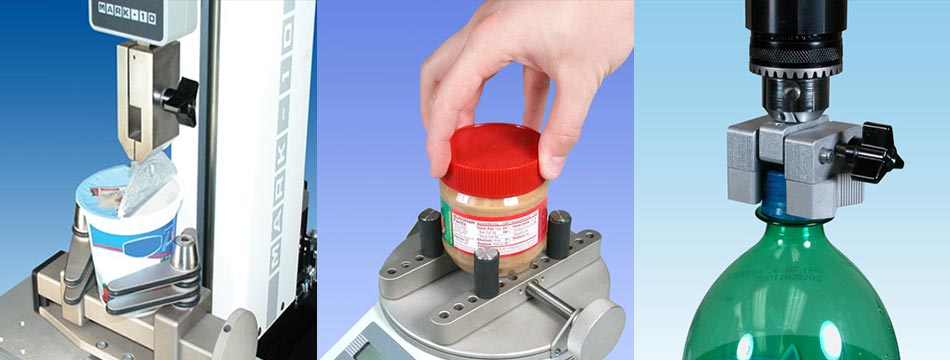
Ensuring that food and drinks packaging/containers provide sufficient seal to preserve freshness while remaining easy to open is crucial to maintaining food safety and reducing waste. Mark-10 has developed an eclectic catalogue of products, including force gauges, torque testers, and test stands, specifically designed to assess the durability and accessibility of packaging. These instruments can be used to measure, amongst other things, the force required to open packets of crisps, the torque necessary to remove threaded bottle caps, and the pressure stacked cartons can withstand.
Quick Links
- Mark-10
- Bottle Cap Torque and Pressure Testing
- Top Load Testing
- Burst Testing
- Crush/ Compression Testing
- Packaging Testing
- Further Information
Mark-10
Founded in 1979, Mark-10 is a leading USA manufacturer of force and torque measurement instruments. A focus on engineering and innovation has enabled Mark-10 to develop solutions specific to applications across the automotive, medical, textile, pharmaceutical, cosmetic, and food and drinks industries. Mark-10’s force gauges, torque testers, and test stands can be used to ensure effective food packaging: they are essential for assessing the integrity and accessibility of food containers, and, to this end, have been specifically designed to carry out the following checks.
Bottle Cap Torque and Pressure Testing
Use Mark-10’s TT01 Series Cap Torque Testers to ascertain the pressure required to twist off bottle caps. If too much force is required, this could injure the consumer, while too little force could result in spillages.
Top Load Testing
Determining the force stacked food/drink containers can bear is pivotal to maintaining a safe storage area and ensuring packaging remains intact and undamaged. Using Mark-10’s Series 3 and Series 5 Force Gauges in conjunction with a manual or motorised test stand allows you to ascertain the maximum top load force cartons and packages can withstand.
Burst Testing
Determine the strength and durability of food packaging, such as crisp packets, by applying pressure inside the bag or container until the seal bursts.
Crush/ Compression Testing
Verify the ripeness and/or readiness for consumption of food/ beverages. When testing the ripeness or durability of food, a sample of the product is placed on a flat surface and a compression plate is lowered onto it. This is one of the most common food tests.
Packaging Testing
Packaging tests consist of checks designed to measure the force required to tear off opening tabs, lids, and handles, as well as pull off bottle caps. They can be used to ascertain the durability of packaging and, like bottle cap torque/ pressure tests, ensure that lids are tight enough to prevent spillages but not so tight the consumer injures themselves when removing it.
Mark-10 offers a number of testing kits suitable for assessing the ergonomics of packaging, including the EKM5-200 Myometer Kit and the Mark-10 Series 3 (M3) Basic Ergonomics Testing Kit.
Further Information
Please browse our collection of Mark-10 products. For further information regarding any of these instruments and their applications or for more details on additional/ unlisted Mark-10 solutions, please contact our Sales team on 01642 931 329 or via our online form.
Footnotes
The information for this blog was gathered using the following sources
- Cooper Instruments and Systems, How Are Food and Beverage Containers Tested? , last accessed 08 June 2021
- Mark-10, MeasuringUP - The Mark-10 Blog, last accessed 08 June 2021


